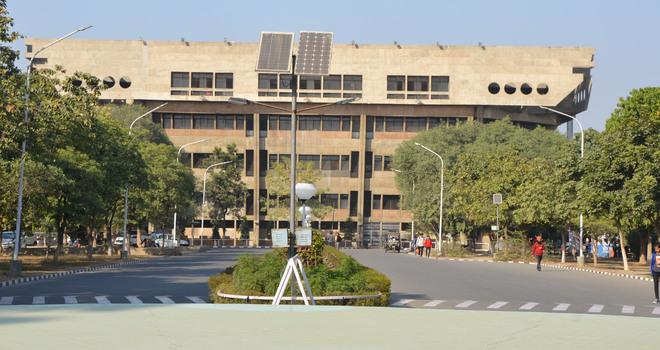Guru Nanak Dev University (GNDU), Amritsar, is transforming its iconic Fountain Chowk into a space that celebrates Guru Nanak Dev and his universal teachings, uniting education and spirituality.
GNDU and Its Vision for Fountain Chowk
Located on a sprawling 500-acre campus near Kot Khalsa, approximately 8 km west of Amritsar on the Amritsar–Lahore highway, GNDU stands as a beacon of higher education in Punjab. The university, established in 1969 and named after the first Sikh Guru, Guru Nanak Dev, has always sought to integrate Sikh values into its academic and cultural ethos. In 2025, GNDU is set to redefine its central landscape feature, the Fountain Chowk, as a living tribute to Guru Nanak Dev’s life and message.
Why GNDU Fountain Chowk Matters
- Fountain Chowk is the focal point of the university’s landscape, serving as a gathering space for students, faculty, and visitors.
- The redesign project aims to symbolise Guru Nanak Dev’s spiritual journey and his emergence from the Bein River in 1499, an event that marked the birth of the Sikh principle of Ik Onkar—the oneness of God and all creation.
- The new design will reflect the values of unity, equality, and universal brotherhood that Guru Nanak Dev championed.
Guru Nanak Dev’s Teachings and Their Influence on GNDU
Guru Nanak Dev’s philosophy is rooted in the belief that all human beings are equal, regardless of caste, creed, or religion. His teachings emphasise:
- Naam Japna: Remembering God at all times.
- Kirat Karna: Earning an honest living.
- Wand Chakna: Sharing with others and promoting equality.
These principles are not just spiritual guidelines but also form the foundation of GNDU’s educational approach. The university’s motto, “The Lamp of the Guru’s Wisdom Illuminates,” highlights its commitment to spreading knowledge rooted in Sikh values.
Also Read: NMMS Scholarship 2024: Apply for NSP Scholarship Awards and Renewals by July 15
The Fountain Chowk Redesign Project: Key Details
- Inspiration: The project draws inspiration from Guru Nanak Dev’s re-emergence from the Bein River, a pivotal moment in Sikh history.
- Architectural Vision: The Fountain Chowk will be reimagined as an architectural marvel, symbolising the unity and universality of Guru Nanak Dev’s teachings.
- Planning Phase: The university is in discussions with both Indian and international architecture firms to finalise the design and aesthetics.
- Rose Garden: A rose garden will be established in the courtyard of the administrative block, complementing the redesigned Fountain Chowk and enhancing the campus’s beauty.
- Community Engagement: The project aims to unite the community and the world through education and knowledge, echoing Guru Nanak Dev’s vision of universal brotherhood.
GNDU’s Broader Initiatives
Beyond the Fountain Chowk redesign, GNDU is undertaking several initiatives to honour Sikh heritage and promote holistic education:
- Guru Nanak Chair: The university has established a Chair in Sikh Studies, supported by an endowment exceeding ₹3 crore, primarily funded by Punjabi NRIs. This Chair will focus on research into Guru Nanak Dev’s spiritual and philosophical teachings.
- Global Collaborations: GNDU has signed memorandums of understanding (MoUs) with international universities, including Samarkand State University in Uzbekistan, to foster academic and cultural collaborations commemorating Guru Nanak Dev.
- Entrepreneurship Programmes: Recognising the employment challenges faced by Indian graduates, GNDU is launching entrepreneurship courses and training programmes to equip students with the skills needed to create their own ventures.
- Forward-Looking Programmes: The university has introduced courses in artificial intelligence, robotics, environmental science, design, journalism, and business analytics, preparing students for emerging fields.
Ik Onkar: The Core of Guru Nanak Dev’s Message
The concept of Ik Onkar—meaning “There is only one God or one Creator”—is central to Sikhism and is symbolised in the redesign of Fountain Chowk. Guru Nanak Dev introduced this principle after his spiritual awakening, emphasising the unity of God and the interconnectedness of all beings. The Fountain Chowk project aims to visually and spiritually embody this message, inspiring students and visitors to embrace unity and harmony.
Know more about the university here.
Upcoming Events and Celebrations
To mark the 350th birth anniversary of Sri Guru Tegh Bahadur, GNDU has committed to organising at least 350 events across its main campus and affiliated colleges by December 2025. These events will celebrate the legacy of Sikh Gurus through academic, cultural, and social engagement.
Key Features of the GNDU Fountain Chowk Redesign
| Feature | Description |
|---|---|
| Inspiration | Guru Nanak Dev’s emergence from the Bein River and the concept of Ik Onkar |
| Architectural Style | Modern yet symbolic, reflecting Sikh heritage and universal values |
| Community Focus | Designed to unite people through education and shared values |
| Additional Elements | Rose garden in the administrative courtyard |
| Timeline | Planning phase in 2025; final design and construction dates to be announced |
| Collaborations | Indian and international architecture firms involved |
Why This Project Matters for GNDU and Punjab
- Cultural Significance: The Fountain Chowk redesign is more than an aesthetic upgrade; it is a statement of GNDU’s commitment to preserving and promoting Sikh heritage.
- Educational Impact: By integrating Guru Nanak Dev’s teachings into campus life, GNDU aims to inspire students to become responsible, compassionate, and globally aware citizens.
- Community Building: The project fosters a sense of belonging and unity among students, staff, and the wider community.
Key Takeaways
- GNDU’s Fountain Chowk is being redesigned to honour Guru Nanak Dev and his teachings.
- The project symbolises the Sikh principle of Ik Onkar—the oneness of God and all creation.
- GNDU is collaborating with global partners and launching new academic initiatives to enrich student life.
- The redesign is part of a broader effort to integrate Sikh values into higher education and community engagement.






Be First to Comment